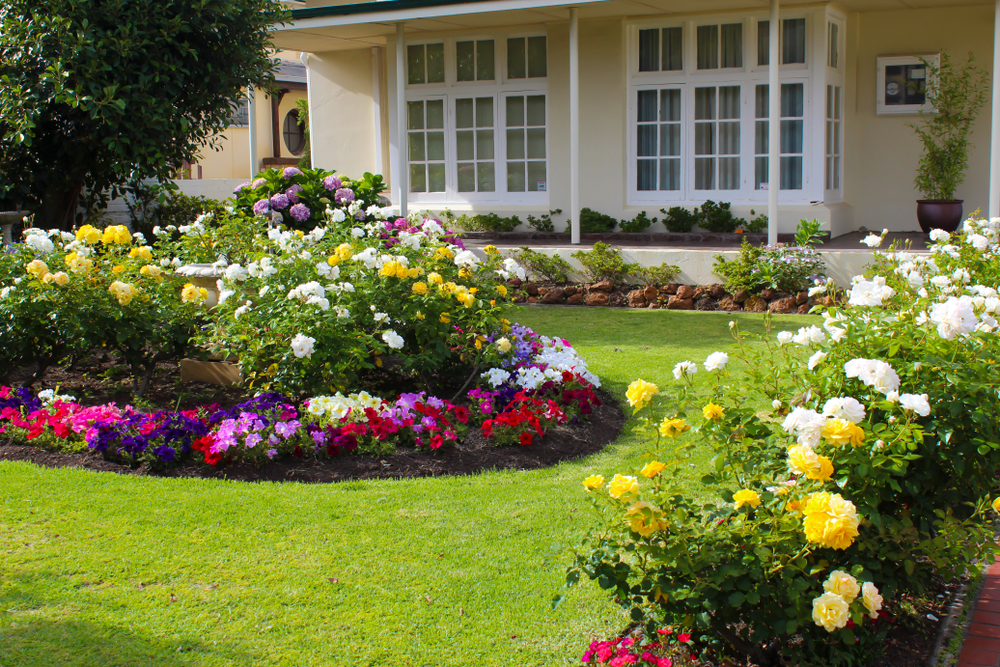Spring is upon us in Utah, and for many gardeners and landscape enthusiasts, this means it’s time to consider themes like flower bed preparation and more to kickstart your landscape. One great way to infuse some additional nutrients and benefits into your flower beds this season: Use of organic compost.
At BioGrass Sod Farms, we’re proud to offer the best premium organic compost and garden soil products you’ll find around Salt Lake City, including organic compost delivery directly to your home. Here are some tips on preparing flower beds and related areas for spring using organic compost, including some of the benefits compost will offer to newly growing plants.
What is Compost?
For those just learning about gardening or composting, you may be wondering what exactly organic compost is. Essentially, it’s decomposed organic material that makes up a nutrient-rich soil amendment perfect for plants and gardens.
Compost can come from a variety of sources such as food scraps, yard waste, manure, and leaves. These materials break down over time through the process of decomposition and create a nutrient-rich substance that provides essential nutrients to help your plants thrive.
Benefits of Using Organic Compost
Organic compost offers numerous benefits when used in garden beds and other areas of your lawn. Some key benefits include:
- Increased Nutrients: As mentioned earlier, organic compost is rich in nutrients that are essential for plant growth. These nutrients include nitrogen, phosphorus, and potassium, as well as micronutrients like calcium and magnesium. By using organic compost in your garden beds, you can provide your plants with a steady supply of these essential nutrients.
- Improved Soil Structure: Organic compost helps improve the structure of soil by increasing its ability to hold moisture, improving drainage, and creating air pockets for roots to grow. This allows for better root development and ultimately leads to healthier, stronger plants.
- Reduces Plant Diseases: Organic compost contains beneficial microorganisms that help suppress harmful pathogens in the soil. This can reduce the risk of plant diseases and promote overall plant health.
- Sustainable Option: Using organic compost is a sustainable and environmentally friendly option. By using organic materials to create compost, we reduce the amount of waste sent to landfills and decrease the need for synthetic fertilizers.
Choosing the Right Compost
As you can see, using compost has many benefits for your plants and the environment. However, not all compost is created equal. It’s important to choose the right type of compost for your specific needs.
Here are some things to consider when choosing a compost:
- Source: Compost can be made from a variety of organic materials such as kitchen scraps, yard waste, or animal manure. Make sure to know the source of the compost you’re using and if it aligns with your values and preferences.
- Maturity: Some compost may not be fully matured and could contain harmful pathogens or weed seeds. Look for finished or cured compost that has been broken down into a dark, crumbly soil-like substance.
- Nutrient content: Compost can vary in its nutrient content based on the sources used and the composting process. Consider your plants’ specific nutrient needs and choose a compost that will provide those nutrients.
- pH balance: Compost can also affect the pH balance of your soil, so it’s important to know what your plants require. Generally, finished compost has a near-neutral pH level, but if you have acidic or alkaline-loving plants, you may need to adjust accordingly.
Specific Uses for Flower Beds in Spring
Here are some of the specific ways you can use compost in your flower beds during the spring season:
- Amending existing soil: If you have existing flower beds that are lacking in nutrients, adding a layer of compost on top and working it into the soil can help improve its overall health and fertility.
- Planting new flowers: When planting new flowers, mix some compost into the hole before placing the plant. This will give the roots a healthy start and provide essential nutrients for growth.
- Top dressing: As your flowers grow throughout the season, periodically add a thin layer of compost around the base of each plant to replenish nutrients and promote healthy growth.
- Compost tea: Another option is to make compost tea by steeping compost in water and using the resulting liquid as a natural fertilizer for your flowers.
- Mulching: Mulching around flower beds can help retain moisture, suppress weeds, and slowly release nutrients into the soil as the mulch breaks down. Using compost as mulch is an excellent way to provide both aesthetic and nutritional benefits to your flowers.
And if you’re looking for the best organic compost products and organic compost delivery services in Salt Lake City, our team at BioGrass Sod Farms is here to help. Contact us today to learn more about our sustainable landscaping products and services.
